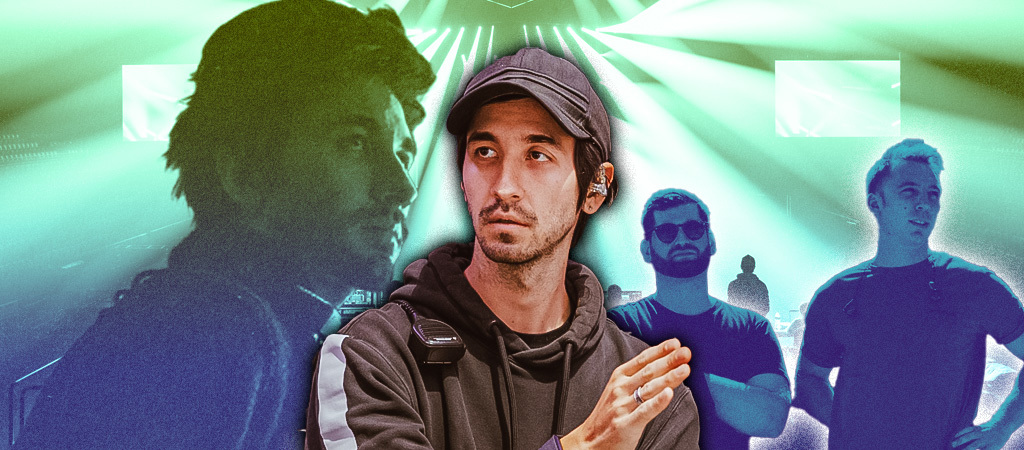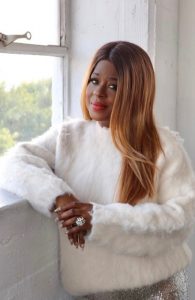MERLE COOPER/UPROXX
“It takes a team” isn’t just a saying to ODESZA. As one of the biggest electronic acts in the world, Harrison Mills and Clayton Knight have built up their global following by surrounding themselves with people who not only believe in their vision but help bring it to life. In fact, the band’s creative leads are very much considered members of ODESZA themselves.
Particularly, SOUND+VISION Award honoree Sean Kusanagi. As a longtime friend of Mills and Knight dating back to their college years at Western Washington University, Kusanagi has played a pivotal role in the creation and evolution of ODESZA.
“I actually ended up introducing Harrison and Clay because I knew both of them and that they were doing separate projects,” Kusanagi says. “Clay was doing Beaches, and Harrison doing Catacomb Kid. I was living with Clay at the time, kind of near our senior year, and I told the guys they should really just get together and play some music.”
ODESZA
When he encouraged Mills and Knight to meet, Kusanagi didn’t envision that the pair would end up forming one of the most renowned touring acts in the country or that it would forever change the course of his own career. Early gigs in ODESZA’s career saw Kusanagi wearing all sorts of different hats, from touring with the band, to playing guitar on the duo’s 2012 album Summer’s Gone, to mapping lasers on the band’s Last Goodbye tour, Kusanagi evolved as a powerhouse creative force in his own right as the band ascended to stardom.
“My role is to make sure that all of the creative elements are working together,” Kusanagi says of his current role in ODESZA. “We’ve always been obsessed with cinema and movies and building cinematic-type experiences. And the show’s no different. It is like we’re telling a narrative, we’re really building a movie on stage for people to see.”
ODESZA
“Music drives everything and being able to work so closely with my friends Harrison and Clay and Luke [Tanaka] thinking as a whole cohesive entity is where just a lot of the magic happens,” Kusanagi continues. “Sometimes it’s a visual that sparks the audio and sometimes the audio sparks a visual or a laser moment or a pyro moment or a costuming moment or a choreography moment. My goal is to just build a world on the stage so that when people show up, they feel immersed for those 90 minutes to two hours and feel like they live inside of this ‘ODESZA world’ that can only exist right then and there.”
We asked Kusanagi what he believes to be the main innovative components that have changed ODESZA’s live shows over the past two decades.
Creative Innovation 1: Drumline & Visual Musicality
ODESZA
So this was one of the first elements that we really brought to life, dating back to around 2015 or 2016. ODESZA being an electronic group, they wanted to bring live orchestral and musicality to a show that is consistently made of computers and electronic elements. I think a lot of people can agree that it’s not very interesting to just watch someone behind a computer. So it probed the question of how do you bring to life all the elements of their music, which is so layered and so textural and has so many different types of worldly samples? That was really the first thing that excited us.
The first thing that we tried was adding some drumming. Harrison and Clay initially just started drumming on stage, actually bringing a drum kit up there. They brought a SPD, toms, and crash to just add some of those initial energies since that’s all they could afford at the time.
We kept wanting to make it bigger though as the shows got bigger. It’s not enough just for the two of them to drum. So we brought on a drumline to represent so many of these rhythms and styles. It was almost 10 years ago now when we partnered with the Colorado University drumline, and what’s fun is some of those members are still with us now.
We wanted to then keep building on ODESZA’s cinematic musicality. That’s where we thought to add string components as well, and we brought strings to one of ODESZA’s first Red Rocks headlining shows. That was the moment where we started realizing there are all these opportunities to build not just around these electronic moments, but around these musical and orchestral moments and make it come to life. ODESZA built on this “cinematic-ness,” which was and continues to be very future-thinking.
Creative Innovation 2: Pyrotechnics
ODESZA
It’s really easy to just put an explosion within a show because we have money and it’ll just make the crowd hyped. But for us, it comes back to the question, “What’s motivating it? Why are we doing it?” We want to think about why we’re doing this and why it makes sense to add any sort of creative element into the live show.
So for us, yes, pyro is a huge part of our show, but we also want to make sure that it feels motivated for how everything is working together. I’ll use “Loyal” as an example here, where we have this army of drummers on the stage and we have this king that is rising from the dead. They’re bringing this loyal king to life. And in that moment we’re like, oh, fire makes so much sense here to add on the stage just because we have this very almost war battle scene happening, both with the drum line and the visuals. The fire is helping accent that.
We use pyro to help tell the story of this ODESZA world that we’re in.
One of the challenges that comes with pyro is the many different stage formats we find ourselves in. With the drumline out, we have a lot of people onstage, sometimes 16 people, while also trying to set off pyrotechnics. We had to work a lot on the choreography or reworked stage positionings to make it work on certain stages for sure. The whole thing gets underestimated, which is why you also don’t see it that often.
We’ve incorporated pyrotechnics for the past five or so years, but it was The Last Goodbye tour where we really dove in and built time code around our pyrotechnics and our special effects like confetti. We had every second planned. Every moment is planned down to the millisecond when it’s happening and how it’s firing and how it’s being shot off in the show.
Creative Innovation 3: Visuals
ODESZA
The mastermind behind the visuals is my partner Luke Tanaka. He’s the lead on a lot of it, but he works with 30-40 artists from all over the world to create the visuals at ODESZA’s shows.
We get to map out the show plan, and what type of visuals for each song, and then work with these really talented artists across the globe to craft the narrative behind every show. This is really Harrison, Clay, Luke, and myself figuring out what type of style we want the visuals to be. Is it animation? Is it Cinema 4D, is it unreal? Is it after-effects?
What type of program do we want to use? What type of visual artists do we want to collaborate with?
An example is our work with Euphoria, this amazing artist up from Canada who did a lot of the album design and album cover design. He built these characters and then we started using these characters as the main representation of the Last Goodbye souls that you actually saw as inflatables up at the Gorge and are also just kind the narrative tie between everything in the show.
We really try to stay away from building your classic three-part loop for each song, which you can see the format of a lot of times, and instead get into what the actual narrative of this show is, how do all these visuals play and intersect together? And then most importantly, what type of visual wants to represent the music in a whole entirely new way so when someone shows up to the show they experience a song and it evokes something different for them and allows them to hear it in a whole new light.
Creative Innovation 4: Lasers
ODESZA
We’ve used lasers for a long time, but we specifically leveled them up for The Last Goodbye tour.
Specifically, the lasers that we brought into the Gorge were a very unique new thing. I think one thing that we’ve always tried to do is if we’re at a special venue [like The Gorge] we want it to feel extra special. So we wanted to see how we could use lasers in a new way.
We actually put lasers behind the crowd and shot them all the way across the Gorge, with more wattage and lasers than what has ever been at that venue before. Projecting them across the crowd and into the background created this expansive place for people. The amount we used was the first time that that’s ever been done in that capacity at that venue.
ODESZA brought out allll the lasers for The Last Goodbye Finale #odesza
I think that’s also the main ethos for every single one of these things. How has it been done in the past and how can we break that mold and how can we recontextualize it or rebuild it in a way that feels like it has always belonged in this set? And even if it is pushing the boundaries of the visuals or the world-building or the lasers or the pyro, the number one thing for all of it is that it works together.
If it doesn’t work together, then it all falls apart. I actually think one of the most innovative things is just building this from friends and building this as a friend group, who have been together since the very beginning and knowing that these are some of the biggest shows. I never thought that I would be in this position of creative directing before Beyonce at Coachella, but to be able to look over and see myself doing this with my friends while sharing a stage with Beyonce or Eminem, and do three nights sold out at the Gorge, that’s everyone’s dream.



